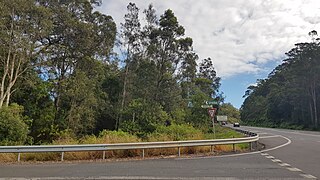
Burnie is a port city in Tasmania, Australia, located in Emu Bay on the north-west coast, 47 kilometres (29 mi) west from Devonport and 17 kilometres (11 mi) east from Wynyard. With an urban population of 19,550 in 2019, Burnie is the fourth largest city in Tasmania, serving as a major port for north-western agricultural and mining industries.

Blackburn is a suburb of Melbourne, Victoria, Australia, 16 kilometres (9.9 mi) east of Melbourne's Central Business District, located within the City of Whitehorse local government area. Blackburn recorded a population of 14,478 at the 2021 census.

Port Macquarie, locally nicknamed Port, is a coastal city in the local government area of Port Macquarie-Hastings. It is located on the Mid North Coast of New South Wales, Australia, about 390 km (242 mi) north of Sydney, and 570 km (354 mi) south of Brisbane. The city is located on the Tasman Sea coast, at the mouth of the Hastings River, and at the eastern end of the Oxley Highway (B56). The city with its suburbs had a population of 47,973 in June 2018 and an estimated population of 50,307 in June 2023.

Ballina is a town in the Northern Rivers region of New South Wales, Australia, and the seat of the Ballina Shire local government area. It lies 740 km (460 mi) north of Sydney and 185 km (115 mi) south of Brisbane. Ballina's urban population at the end of 2021 was 46,190. The town lies on the Richmond River and serves as a gateway to Byron Bay.

Eurobodalla Shire is a local government area located in the South Coast region of New South Wales, Australia. The Shire is located in a largely mountainous coastal region and situated adjacent to the Tasman Sea, the Princes Highway and the Kings Highway.

West Pymble is a suburb on the Upper North Shore of Sydney in the state of New South Wales, Australia 15 kilometres (9.3 mi) north-west of the Sydney Central Business District in the local government area of Ku-ring-gai Council. Pymble is a separate suburb to the east, sharing the postcode of 2073.

Macquarie Park is a suburb in the Northern Sydney region of Sydney, New South Wales, Australia. Macquarie Park is located 13 kilometres north-west of the Sydney central business district in the local government area of the City of Ryde.

Marsfield is a suburb in the Northern Sydney region of Sydney, in the state of New South Wales, Australia. Marsfield is located 16 kilometres north-west of the Sydney central business district in the local government area of the City of Ryde.

Wauchope ( ) is a town in the Mid North Coast region of New South Wales, Australia. It is within the boundaries of the Port Macquarie-Hastings Council area. Wauchope is inland on the Hastings River and the Oxley Highway 19 km (12 mi) west of Port Macquarie. The town is 383 km (238 mi) north of the state capital Sydney.

Crescent Head is a town on the Mid North Coast, 340 km north-northeast of Sydney, in The Kempsey Shire local government area of New South Wales, Australia. At the 2021 census, Crescent Head had a population of 978 people. Its major industries include tourism and fishing. It has a 6-hole golf course overlooking the sea.

Port Macquarie-Hastings Council is a local government area in the Mid North Coast region of New South Wales, Australia.

Tweed Shire is a local government area located in the Northern Rivers region of New South Wales, Australia. It is adjacent to the border with Queensland, where that meets the Coral Sea. Administered from the town of Murwillumbah, Tweed Shire covers an area of 1,321 square kilometres (510 sq mi), and has existed as a local government entity since 1947. It was named for the Tweed River.
Speers Point is a suburb of Greater Newcastle, and the location of the council seat of the City of Lake Macquarie local government area in New South Wales, Australia. It is 17 kilometres (10.6 mi) west-southwest of the city of Newcastle on the northern shore of Lake Macquarie, in Cockle and Warners Bays, between the suburbs of Cardiff and Warners Bay.

Great Lakes Council was a local government area in the Mid North Coast region of New South Wales, Australia. The area is situated adjacent to the shores of Port Stephens, Myall Lakes and Wallis Lake and the Pacific Highway and the Lakes Way. On 12 May 2016 the council was dissolved and the area included in the Mid-Coast Council, along with the City of Greater Taree and Gloucester Shire.

Sunshine North is a suburb in Melbourne, Victoria, Australia, 13 km (8.1 mi) west of Melbourne's Central Business District, located within the City of Brimbank local government area. Sunshine North recorded a population of 12,047 at the 2021 census.
Lansdowne is a rural village on the Mid North Coast near Taree in New South Wales, Australia.
Pimpinio is a town in the Rural City of Horsham, Victoria, Australia. It is 15 km from the City of Horsham and 317 km from the Victorian capital city Melbourne. As of the 2021 Australian census, Pimpinio had a population of 191 people.

Sutherlands is a rural locality in the Mid North region of South Australia. It is situated 12km east of Eudunda and 125km northeast of Adelaide in the Regional Council of Goyder. As of 2021, Sutherlands has a population of 33 people.

Rollands Plains is a village and bounded rural locality in Mid North Coast of New South Wales, Australia.

Uralba is a rural locality located on the Far North Coast of New South Wales. Its name means "place of plenteous quartz stones".

















